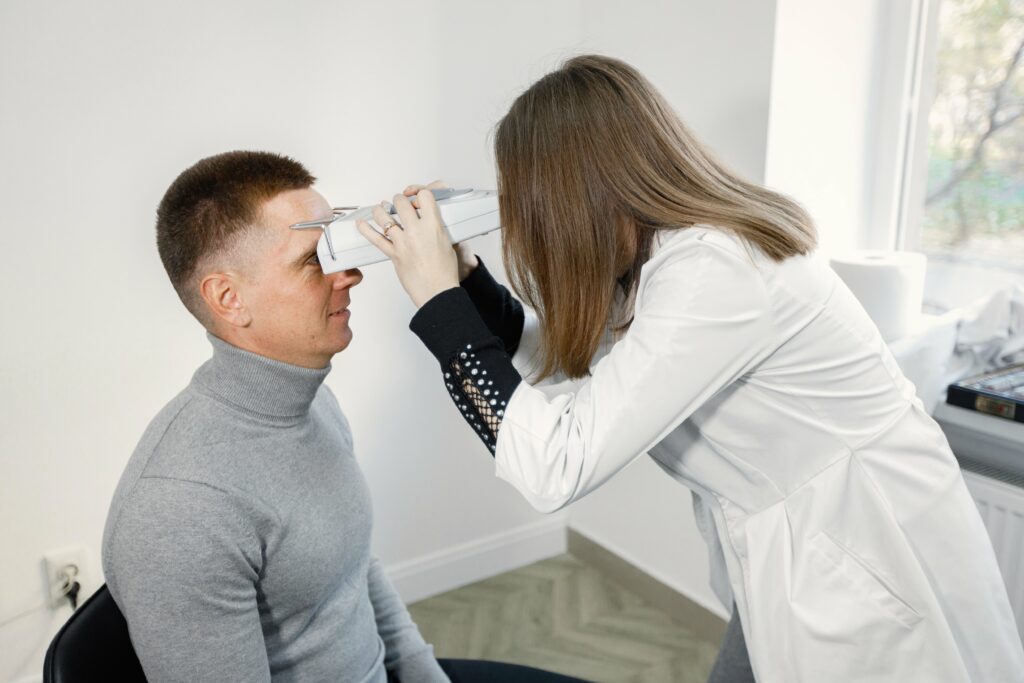There’s a common phrase that the eyes are “the windows into the soul.” At Center For Sight, your trusted ophthalmologist in Sarasota, knows they’re so much more than that; they’re the windows into your overall health. Routine eye exams reveal clues about various undiagnosed or unmanaged health conditions. By maintaining regular eye check-ups, you can catch the signs of illnesses before it’s too late.
Your Eye Exam May Spot Any of These Ten Health Issues
While our experts advocate for eye exams every one to two years, we may all miss an appointment from time to time. When you make your next eye appointment, here are ten common health issues that have the potential to present themselves. These are not just localized to specific eye diseases—they cover many serious illnesses that can impact your overall well-being.
1. Skin Cancers on the Eyelid
Skin cancers like basal cell carcinomas may appear on the eyelids, especially in people overexposed to sunlight. Our eye center advises against tanning beds and encourages UV-blocking sunglasses and hats to prevent sun-related skin cancers. Likewise, ophthalmologists and optometrists in Sarasota may notice signs of leukemia or lymphoma, both of which can impact the appearance of the eyes with blurry retinas.
2. Brain Tumor
Eye exams can reveal brain tumors, which may not present noticeable symptoms until they press against the optic nerve. As a first sign, ophthalmologists in Sarasota may observe swelling at the back of the eye. Patients with such tumors may experience changes in vision, headaches, and fatigue.
3. Diabetes
Surprisingly enough, diabetic retinopathy, which is a complication of diabetes affecting the eye, may actually occur before a type 2 diabetes diagnosis. A clear sign of its formation can be identified through yellow fluid or blood leaking from tiny blood vessels. Upon further investigation, diabetes can be diagnosed just from a simple eye visit.
4. High Blood Pressure (HBP)
Unusual bends, kinks, or bleeding from small blood vessels in the back of the eye can indicate high blood pressure. With approximately 48% percent of American adults aged 18 and over living with hypertension (2017-March 2020), ophthalmologists may commonly diagnose this condition by identifying these signs. Blood pressure testing at the eye office can also lead to lifestyle recommendations for managing HBP.
5. Giant Cell Arteritis (GCA)
GCA impacts the arms, neck, and upper shoulders by restricting the arteries. However, blurred or double vision and even rapid vision loss in one eye can signal this condition. Detecting GCA early through an eye exam can prevent permanent vision loss and deter GCA-related severe complications from occurring.
6. Certain Autoimmune Disorders
Like dry eyes in lupus patients or red and painful eyes in rheumatoid arthritis patients, autoimmune disorders can also affect the eyes. Myasthenia gravis can reveal itself through droopy eyelids, or double vision spurned from muscle weakness.
7. High Cholesterol
High cholesterol can manifest in eye-related problems, like yellow or blue rings around the cornea or deposits in the blood vessels feeding the retina. These symptoms allude to untreated, chronic high cholesterol, increasing the risk of a stroke.
8. Thyroid Issues
An overactive thyroid can cause the eyes to bulge, making the whites of the eyes more visible. Additionally, dry eye, blurred vision, and vision loss can also occur in people with hyperthyroidism. Regular eye appointments can help monitor thyroid-related eye issues to ensure your situation won’t worsen.
9. Sexually Transmitted Diseases (STDs)
Common STDs, such as syphilis, herpes, chlamydia, HIV, gonorrhea, and genital warts, can trigger eye problems by attacking the eye tissues. Without proper maintenance, even pubic lice can migrate to the eyelashes and cause inflammation (blepharitis).
10. Lyme Disease
Unfortunately, Lyme disease symptoms can go unnoticed and undiagnosed for years. But by reporting eye floaters or optic nerve swelling to an eye care doctor, patients can catch Lyme disease in its early stages.
More Reasons To Book An Eye Exam
Even if you believe you’re in peak physical condition and experience zero eye discomfort or problems, the first signs of many serious conditions can go unnoticed. Additionally, some illnesses may only develop due to genetics and other factors. Consulting an experienced ophthalmologist in Sarasota not only helps you maintain clear vision but also serves as one of the best preventative health strategies.
Ready to book your eye exam? Contact the team at Center For Sight to keep your world in focus.
The advice in this blog is for general informational purposes only and may not be suited for your exact insurance plan and cataract needs. Therefore, consulting a qualified healthcare professional for personalized advice and treatment is essential.







